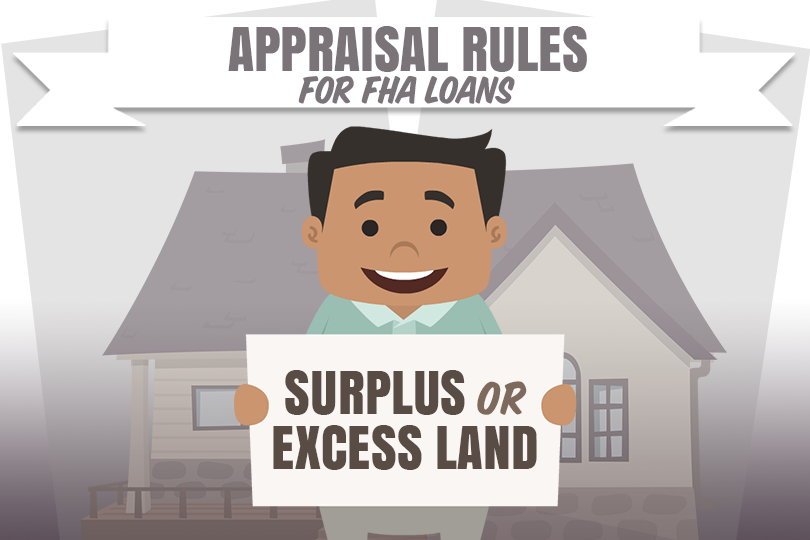FHA Loans, Appraisals, and Excess Land
May 3, 2023
FHA loan rules in HUD 4000.1 discuss appraisal issues related to surplus land or excess land--how does this issue affect the valuation of the home?
The Definition of Surplus or Excess Land
The definition of and rules for surplus/excess land can be found in HUD 4000.1, which says, "Excess Land refers to land that is not needed to serve or support the existing improvement. The highest and best use of the Excess Land may or may not be the same as the highest and best use of the improved parcel. Excess Land may have the potential to be sold separately."
The terms "excess" and "surplus" are NOT interchangeable. Surplus land is described in HUD 4000.1 as, “...land that is not currently needed to support the existing improvement but cannot be separated from the Property and sold off."
Furthermore, surplus Land does not have an independent “highest and best” use. It may or may not “contribute to the value of the improved parcels" according to HUD 4000.1.
FHA Appraisal Guidelines for Surplus/Excess Land
The FHA loan rules for surplus/excess land include a requirement that the FHA appraiser includes the “highest and best” use of the property, “...to support the Appraiser’s conclusion of the existence of Excess Land. The Appraiser must include Surplus Land in the valuation."
FHA loan rules and that in cases where there are “two or more legally conforming platted lots under one legal description and ownership”, and the second vacant lot can be divided /developed “as a separate parcel where such a division will not result in a non-conformity in zoning regulations for the remaining improved lot, the second vacant lot is Excess Land."
The value of the second lot would be excluded from the “final value conclusion of the appraisal”. The appraiser must value the principal site and improvements, “under a hypothetical condition".
There may also be state law and/or lender standards that factor into these procedures. Remember that FHA loan rules are not the only guidelines that will inform the lender’s choices in certain areas. Lender standards and state law will also play an important role.
There are many situations where surplus or excess land might be a factor. If you are not sure how much land is considered “excess” or “surplus”, ask a lender what is typical for the local area and what is considered outside the norm. Your experience may vary; it’s not safe to assume that what is considered “surplus” in one housing market might be considered more typical in another.
------------------------------
RELATED VIDEOS:
What Is an FHA Loan?
Using an FHA Loan Calculator
Meeting FHA Loan Guidelines Improves Your Chances

FHA Loan Articles
April 30, 2025 In a previous post, we discussed why FHA borrowers should carefully consider whether paying for discount points truly serves their best interests, focusing on factors like short-term homeownership, opportunity cost, FHA mortgage insurance, and the prevailing interest rate environment. Discount points are an option for borrowers willing to pay a fee to lower the interest rate by a set amount. This is not right for all borrowers, and you don't want to pay for points you won't benefit from during the loan term.
April 29, 2025Are you considering buying a home with an FHA loan? You'll likely talk to your participating lender about FHA loan "discount points" – fees you pay upfront for a lower interest rate on your mortgage. The idea behind discount points is a straightforward exchange: you spend money today to reduce your interest rate. Typically, one point equals one percent of your total FHA loan. In return, your interest rate might decrease by an amount you and the lender agree upon.
April 28, 2025Home loans have various expenses that aren't apparent to a new borrower until much later in the process. What do you need to consider when making your home loan budget? It might not be complete without addressing some of the issues we cover here.
April 23, 2025 While the prospect of lower interest rates or more favorable loan terms can be enticing, there are situations where waiting is the better option. Refinancing without carefully considering your current financial circumstances is never a good idea, but careful planning in the current financial environment is even more important.
April 22, 2025First-time home buyers worry about loan approval, but there are important steps to take to increase the likelihood that the lender will approve their application for the loan or pre-approval. What do you need to know before you choose a lender?







